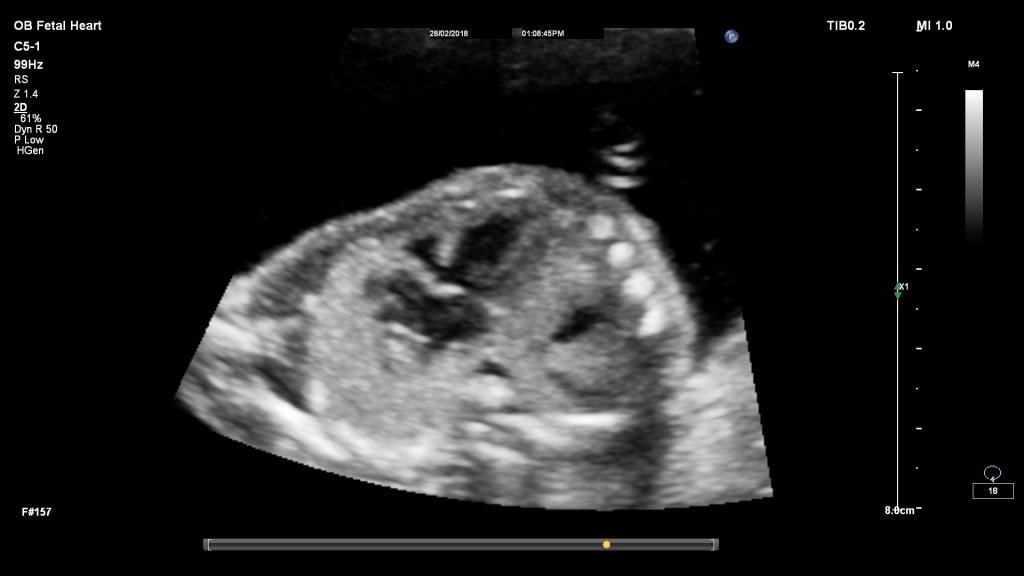
Importance of heart defects in newborn and fetuses
- Heart diseases are leading cause of neonatal death which are preventable.
- 8/1000 live births (0.8%) (Critical CHD 50%)
- 30-40/1000 still born (3 to 4%)
- 20/1000 premature infants excluding PDA (2%)
- 100-250/1000 abortuses (10 to 25%)
We can diagnose them before Birth ( in fetus) and save precious lives .
How early we can diagnose ?
| Diagnosis possible | can be missed | |
|---|---|---|
| 22-26 weeks (conventional timing) | Most heart diseases, including TOF, TGA, DORV, single ventricles, AVSD(Down’s), TAPVC, HLHS, PAIVS | Small VSD, AP window, ALCAPA, TAPVC , AS,PS |
| 18-22 weeks(American heart association 2015) | Most heart diseases, including TOF, TGA, DORV, single ventricles, AVSD ( Down’s), TAPVC, HLHS, PAIVS | Small VSD, AP window, ALCAPA, TAPVC , AS,PS, HLHS, PAIVS |
| 14-16 weeks for High risk pregnancies | TOF, TGA, DORV, single ventricles, AVSD ( Down’s), HLHS, PAIVS | |
| 11-13 weeks For high risk pregnancies | TOF, TGA, DORV, single ventricles, AVSD, HLHS, PA IVS( 60% of all heart defects) |
Sensitivity / Specificity of fetal echo
(for paediatric cardiologist)
| Sensitivity | Specificity | |
|---|---|---|
| 1st Trimester 11-13 weeks | 87% | 99%S |
| 14-16weeks | 91% | 99% |
| 18-22 weeks | 95% | 99.9% |
| 22-24 Weeks | 97% | 99.9% |
Rasiah SV, A sysematic review of the accuracy of first-trimester ultrasound examination for detecting, major congenital heart disease. Ultrasound Obstet Gynecol 2006;28:110–116.
Ventriglia et al., Pediatr Ther 2016, 6:1
Why fetal echo before 20 weeks?
- MTP act allow termination of pregnancy up to 20 weeks with consultation of gynecologist.
- If complex heart disease is diagnosed after 20 weeks, termination of pregnancy will be a difficult legal problem.
- With current technology and expertise, early scan (14-18weeks ) is as sensitive and specific as late scan (24weeks).
High risk mothers> 2%
( Who are targets?)
- Maternal pre-gestational diabetes mellitus, Diabetes mellitus diagnosed in the first trimester
- Maternal phenylketonuria (uncontrolled)
- Maternal autoantibodies (SSA/SSB+)
- Maternal medications
- ACE inhibitors, Retinoic acid, NSAIDs in third trimester
- Maternal first trimester rubella infection
- Maternal infection with suspicion of fetal myocarditis
- Assisted reproduction technology
High risk mother (continued)
- CHD in first degree relative of fetus (maternal, paternal or sibling with CHD)
- First or second degree relative with disorder with Mendelian inheritance, with CHD association
- Fetal cardiac/ extra-cardiac abnormality suspected on obstetrical ultrasound
- Fetal karyotype abnormality
- Fetal tachycardia or bradycardia, or frequent or persistent irregular heart, rhythm
- Fetal increased NT >95% (≥3 mm)
- Monochorionic twinning
- Fetal hydrops or effusions
Intermediate risk mother: 1 to 2%
- Maternal medication
- Anticonvulsants, Lithium, Vitamin A, SSRIs (only paroxetine), NSAIDs in first/second trimester
- CHD in second degree relative of fetus
- Fetal abnormality of the umbilical cord or placenta
- Fetal intra-abdominal venous anomaly
Low risk <1% ( not indicated)
- Maternal gestational diabetes mellitus with HbA1c <6%
- Maternal medications,
- SSRIs (other than paroxetine)
- Vitamin K agonists (Coumadin), although fetal survey is recommended
- Maternal infection other than rubella with seroconversion only
- Isolated CHD in a relative other than first or second degree
What parents should understand
- Accurate diagnosis ( exact nature of heart disease in fetus)
- Complete and scientific information about management plan and prognosis
- Outcome in-utero and natural history
- Possible need for surgery immediately after birth
- Timing of surgery / surgeries/ interventions ( some times 2 , 3 or even more)
- Possible complications, adverse events, morbidity, mortality due to surgeries
- Long term prognosis ( 15 yrs to 20 yrs some times 40 yrs, Disease specific)
- Possible long term complications ( Disease specific)
Discuss options
- Continue pregnancy
- Where to deliver,
- Immediate post natal care,
- Timing of interventions etc
- Termination of pregnancy
- In utero interventions
- VSD in fetal echo

Informed decision making
- Help parents to come to decision:
- Respect free will,
- Honor social, cultural, religious, personal etc beliefs
- Never offer hope with possible miracle therapies or cures.
- Heart transplant is just a palliation with median survival close to 8 to 12 years
- Requires lot of empathy, patience ,
Malhotra et.al. Ethical Issues in FetalManagement: A Cardiac Perspective Volume 2010, Article ID 857460
Cardiac causes of IUFD (Intra uterine fetal death)
- Complete AV block
- Tachycardia
- Long QT syndrome
- Cardiomyopathy: Hypertrophic/ dilated
- Severe valvar regurgitation ( Ebstein/ AVSD)
- Hypoplastic left heart syndrome
- Left isomerism
- Right isomerism
- Pulmonary atresia intact interventricular septum
- ( The list is neither exhaustive nor complete)



REPLY COMMENT